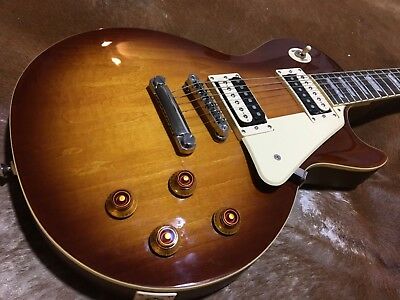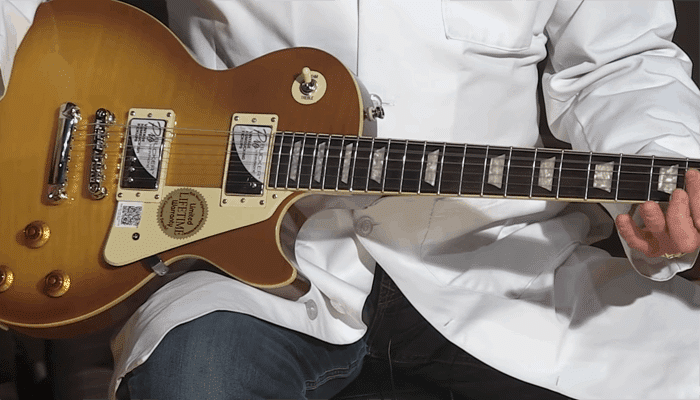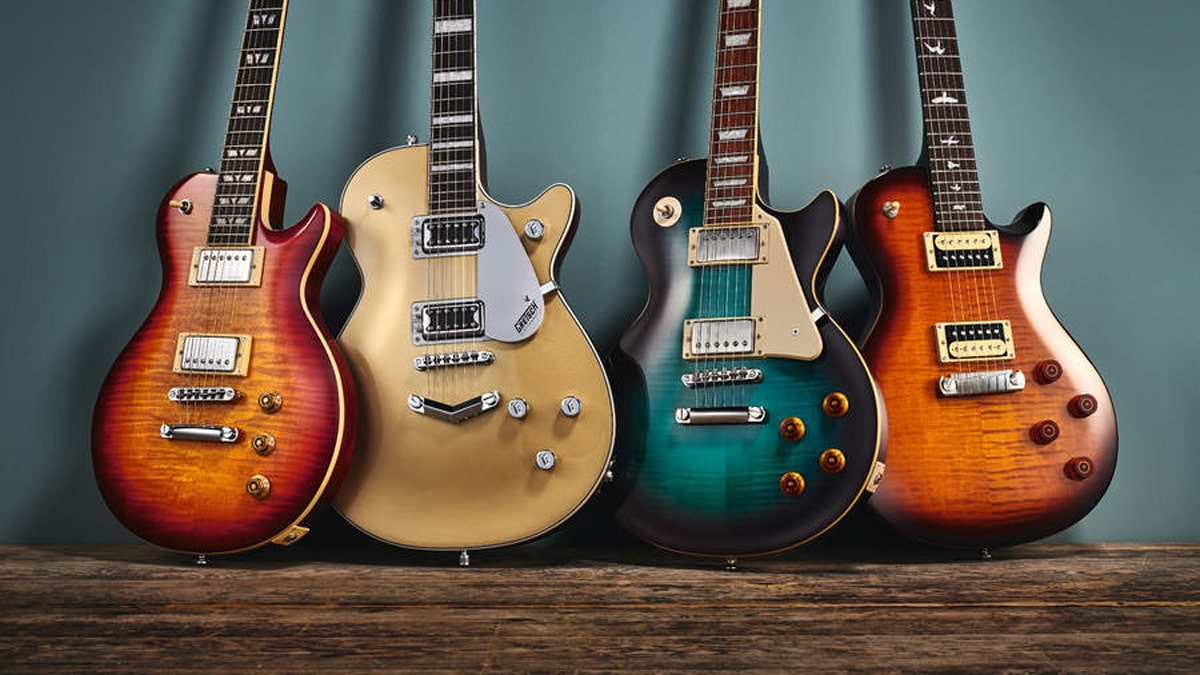Contents
The one that comes on top in Epiphone Les Paul Traditional Pro vs Standard is the topic of many debates among music enthusiasts. In use, both guitars give a good account of themselves for most of the time so people can’t easily decide. Continue reading to determine which guitar is the best one for you.
Epiphone Les Paul Traditional Pro
The stunning looks of the Les Paul Traditional Pro electric guitar is hard to resist. Not only that, its affordable price tag gives it an upper hand for budget buyers who are looking for a great Les Paul alternative. This solid-body guitar with mahogany neck has a very excellent neck-to-body contact to appear like one continuous piece of wood.

This guitar is also equipped with a combination of Alnico Classic Pro humbucker and Epiphone’s ProBucker-3 humbucker. Such configuration isn’t very common on electric guitars, so it’s something worth checking out. Combined with the coil-splitting feature of both volume controls, you’ll have endless possibilities when it comes to the versatility of sounds from this Les Paul.
Epiphone Les Paul Standard PlusTop Pro
It’s hard to settle for less when you want to get more of the famous Les Paul. Even with the cheapest version of the Gibson Les Paul, not everyone can afford it. But, there’s good news – the Epiphone Les Paul Standard PlusTop Pro. This is closely identical to the Les Paul Standard – dual humbuckers, maple top, set neck joint, 24.75-inch scale length, etc.

Out of this Epiphone guitar, you’ll get warmer tones, great sustain, and soulful distortion. It has a very comfortable slim neck profile providing outstanding playability. But, do you think this can be at par with the original Les Paul? Let’s find out.
The Main Differences
Let’s first discuss the comparison between the specifications of these guitars. The table below will help you spot their difference objectively.
| Epiphone Les Paul Traditional Pro | Epiphone Les Paul Traditional Pro | |
| Body Shape | Single cutaway | Single cutaway |
| Body Type | Solid body | Solid body |
| Body Material | Solid mahogany | Solid mahogany body with carved maple top |
| Neck Shape | D standard | Slim-tapered |
| Neck Material | Mahogany, set-in | Mahogany, set-in |
| Scale Length | 24.75 in. | 24.75″ |
| Fretboard Material | Rosewood | Rosewood |
| Fretboard Radius | 14 in. | 12″ |
| Number of Frets | 22 medium jumbo frets | 22 medium jumbo frets |
| Pickups | neck pickup: Alnico Classic bridge pickup: ProBucker 3 |
neck pickup: ProBucker 2 bridge pickup: ProBucker 3 |
| Controls | 2 volumes with coil-split feature; 2 tones; 3-way pickup switch | 2 volumes with coil-split feature; 2 tones; 3-way pickup switch |
| Bridge and tailpiece | Fixed Tune-o-matic bridge with stopbar tailpiece | LockTone Tune-O-Matic bridge and stopbar tailpiece |
Build & Design
As you can see from the table, there is no cheap material used for both guitars. Hence, you are assured a solid construction of much better sound quality of these guitars. More so, the finish will also not disappoint you. The Traditional Pro has Ebony, Heritage Cherry Sunburst, and Ocean Blue Burst options, while the Standard gives you tons of color options including Vintage Sunburst, Trans Blue, and so much more.
It’s very common for budget-buyers, especially beginners, to choose either of these two because they can really get the looks of the classic Gibson Les Paul. There’s not much difference in sound quality, too. Hence, there’s always a question on whether the Epiphone Les Paul Traditional Pro or Standard is better.
Feel & Playability
Even though they are more affordable Les Paul alternatives, you will not be disappointed with the string action of these guitars. Especially for the Traditional, the action is spot-on. And, even if you have a slightly high (or low) action, the Tune-O-Matic bridge allows easier and more accurate adjustments. The frets and the fretboard in both guitars is smooth – surfing up and down the fretboard is definitely not a problem.

However, based on the overall experience, the Standard PlusTop Pro seems to be an old friend. With its SlimTaper neck profile, it’s much more comfortable than the D standard of the Traditional. This is a ‘plus point’ especially for those who have been playing Les Paul guitars all their life.
Pickups & Tonality
Epiphone succeeded in delivering authentic Gibson Les Paul tones through these guitars. The coil-splitting feature of the Traditional Pro allows you to easily switch between humbuckers to single-coil sounds. You’ll enjoy rich and full sounds, which is quite similar to Gibson Les Paul.
For the Standard PlusTop Pro, on the other hand, you can easily get clear and warm tones with very responsive attacks. It offers great sustain with fat midrange. If the treble is enhanced while the coil-split feature is enabled, you’ll eventually achieve the P-90 single-coil sounds.
When plugged into the right amplifier, it’s hard to distinguish the kind of guitar used based on the sound output. Here’s a YouTube video to help you appreciate how great these Epiphone Les Paul guitars are without breaking the bank.
Price
Depending on the store where you want to get these guitars, one can be slightly more expensive than the other. And, in most cases, the Standard PlusTop Pro is way more expensive than the Traditional Pro. However, you might also be wondering why the Standard PlusTop Pro is way more expensive than the Epiphone Les Paul Standard? This is because of the more upgraded pickups. Given the versatility and beauty of the Standard PlusTop Pro, it’s definitely giving the best value for its price.
Conclusion
You’ve come to the end of the article, which means, you’ve read all the comparisons and contrast of Epiphone Les Paul Traditional Pro vs Standard PlusTop Pro in terms of design, sound, and performance. By now, you definitely have your choice.

Given all the arguments laid out in this article, the Traditional Pro is an excellent guitar if you are really on a budget. From the design and the finish, its performance won’t let you down. However, if you want to be more professional and enjoy more upgraded pickups, then, get the Standard PlusTop Pro. It’s a bit expensive though, yet, it’s definitely worth it.

Hi music fan! I am Jeff. Hope that you enjoy some stuff I shared here in my personal blog.
About myself, Currently I am in charging as Artist Manager/Music Supervisor at 72 Music Management. I did managed album to Grammy Award in 2017 with 7 Nominations from 2014-2020 and had the opportunities to work with : A.J. Croce, Blind Boys of Alabama, Bobby Rush, Dom Flemons, Dustbowl Revival, Sarah Grace
Governor of the Memphis Chapter of The Recording Academy is one of a award that I am lucky to achieved.
